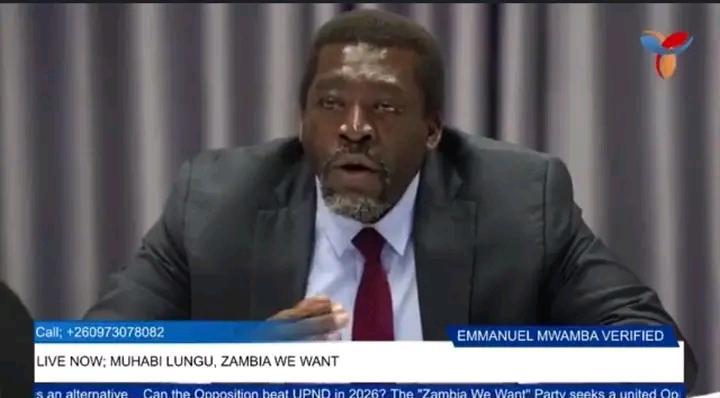Africa-Press – Zambia. In a searing live broadcast on Emmanuel Mwamba Verified, former diplomat and economist Muhabi Lungu delivered what is arguably the most direct political reprimand yet of Zambia’s fractured opposition. With unflinching clarity and statistical precision, Lungu laid bare the existential stakes facing Zambia ahead of the 2026 general elections and issued a rare public appeal for humility, realism, and unity among the country’s fragmented opposition leaders.
Appearing as a guest on Mwamba’s widely followed program, Lungu did not mince words. Drawing from electoral history, demographic data, and hard political truths, he argued that unless opposition leaders form a united front – and do so soon – they risk handing President Hakainde Hichilema and his United Party for National Development (UPND) an uncontested path to a second term.
“There is no contender,” Lungu declared. “For the first time since 1991, Zambia is heading into a general election without a single opposition figure who can, alone, pose a credible threat to the incumbent.”
A NATION ON THE BRINK
For Lungu, the matter is not merely political – it is existential. “The state of the nation is very bad,” he warned early in the interview, citing what he described as an unprecedented ethnic polarization, politicization of national statistics, and a systematic weakening of democratic institutions. He accused the UPND administration of shrinking Zambia’s democratic space through repressive laws, intimidation of opposition figures, and what he termed “psychological warfare” on the legacy and family of late former President Edgar Chagwa Lungu.
At the heart of his concern was a stark prognosis: Zambia faces a crisis not just of governance, but of national cohesion.
“There is a dangerous effort to rewrite truth, distort data, and weaponize identity. That is how authoritarian regimes begin-and how nations collapse.”
THE CASE FOR A SINGLE TICKET
Lungu’s central thesis was statistical, not sentimental. He outlined three core conditions for electoral victory in Zambia:
1. Winning at least three of the five largest provinces (Lusaka, Copperbelt, Eastern, Northern, Southern).
2. Achieving a minimum 15% showing in at least three of the four remaining provinces.
3. Doing so with one or two opposition candidates, not more.
“Without meeting those thresholds,” he said, “no candidate can reach the constitutionally required 50% + 1 margin. It’s mathematically impossible.”
He dismissed arguments that voter disillusionment with UPND would automatically translate into regime change. “That’s conjecture,” he said flatly. “There is no empirical evidence to support that theory.”
*NO TO PERSONAL AMBITION*
But it was Lungu’s personal stance that shocked and resonated most. Asked whether he would stand for president in 2026, he issued a categorical no – a rare posture in a political culture often driven by personal ambition.
“We are too many people with small names and small money who suddenly believe we must be president,” he said. “I’ve never needed a title to be heard. I’ve never needed power to have influence.”
In one of the broadcast’s most defining moments, Lungu listed five types of opposition actors he believes are sabotaging unity efforts:
1. The delusional, who overestimate their electoral worth.
2. The opportunists, who run to raise donor funds.
3. The Trojan horses, planted to divide the opposition.
4. The career hedgers, hoping to grow their vote share for 2031.
5. The cynics, who believe unity is impossible and prefer a fragmented race.
Each category, he argued, reflects a failure of patriotism and a dangerous abdication of leadership responsibility.
PRIMARIES AND A SOCIAL CONTRACT
Responding to a caller’s question, Lungu endorsed the idea of a pre-election primary or equivalent process to identify the strongest opposition ticket, emphasizing the need for public input and transparency.
“We can’t afford another backroom deal. Let the people help determine who is best suited to carry the banner,” he said.
In tandem, he called for a binding social contract signed by the selected presidential ticket and witnessed by civil society organizations. This contract, he suggested, should commit to constitutional reform, economic equity, and the restoration of institutional independence within the first three years of a new government.
“We want a government of reformers, not opportunists. A presidency grounded in accountability – not cults of personality.”
EXISTENTIAL THREAT” IS NOT HYPERBOLE
Lungu repeatedly referred to Zambia’s current moment as an “existential threat,” a term he tied to three crises:
1. *Ethnic polarization,* allegedly promoted from the highest office.
2. *Democratic backsliding,* through abuse of institutions and laws.
3. *State cruelty,* especially the targeting of the Lungu family and manipulation of public mourning.
He condemned what he called the “psychological torture” inflicted on the late President’s family and challenged the government’s attempt to verify the identity of his corpse weeks after public announcements of his death.
“This is one of the darkest moments in our history. A Christian nation entertaining the idea that a family might fake the death of its patriarch? It’s vile. It’s cruel.”
WHAT COMES NEXT
The message from Muhabi Lungu was not just a critique – it was a blueprint.
If followed, his proposal could redefine the opposition’s trajectory. If ignored, it may mark a tragic turning point in Zambia’s democratic journey. In the days following the interview, political watchers across Lusaka, Johannesburg, and London have echoed a singular theme: *time is running out.*
Whether the Patriotic Front, the Socialist Party, and emerging players like “The Zambia We Want” coalition heed the call remains to be seen. But the stakes, as Lungu warned, could not be higher.
“This is not just about removing a government. It’s about rescuing a nation.”
Brian Matambo is a journalist, filmmaker, and political analyst based in Sandton, South Africa. He writes on African governance, democratic transitions, and AI-powered civic systems.
For More News And Analysis About Zambia Follow Africa-Press







